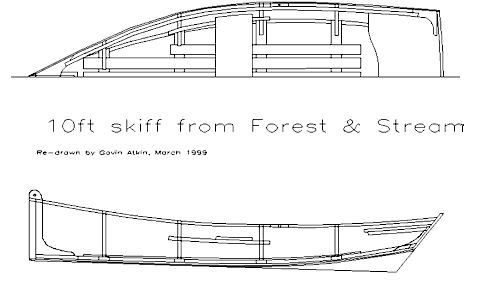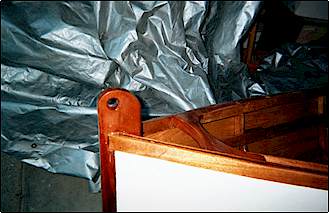| May, 2001
From Gavin Atkin in Kent England
The story behind this little boat goes back two years or more,
when Craig O'Donnell sent me some scans he had taken from a
late 19th Century copy of Forest and Stream because he
thought I would 'like it'.
Like it? I loved it, and immediately set out to model it using
Gregg Carlson's Hull Modeller. Thinking that some people might like
to build it from plywood either by stitch and glue, or using
internal chines, I made the original gifs and my CADified,
plywoodified version available via my web pages at: https://home.clara.net/gmatkin/design.htm
. In fact I liked it so much that a little later I also used one of
the scans to decorate the top of my pages. A pal of mine said he
felt that the boat was so salty that it made his eyes hurt.

Cute this boat may be on paper, but no-one seemed to take much
notice of the F & S skiff until earlier this year when
Allen Frazier of San Francisco, California wrote to say he was
building one and wanted to know how many others I knew about? I had
to tell him he was the first I knew about.
Allen launched recently, as you can see from the pictures, and
this is what he said about the project:
|
'The
pics aren't all they should be, but they'll give you a good idea
of what she looks like in the water and in my shop.
'She really turns heads. I get more compliments on
this little boat than you can imagine. On launch day, by
coincidence, the
|
 |
| "Alma" was in our harbor (the Alma is a
sailing cargo scow from 1890 (about 80 feet) that has been
fully restored - she's owned by the State of California who
operate it for the public just like a park might be operated).
In any even, the crew are salty and knowledgeable. My
son reported that many of the crew were at the rail ready to
chat and complement her as he passed by. He has been using it
more than I, and he is actually getting a little tired of being
interrupted to take compliments and chat about her lines, etc. |
 |
'She's
heavily laden in these pictures. The guy in the white hat is
me and I weigh in at about 220 lbs. My son is the other guy
and he's about 6 feet 2 ins., and is close to that weight.
Sorry, you'll have to convert to metrics (aren't I about 20
stone??). |
| 'As
to performance... She glides very smoothly and is quick. More like
a boat of much longer length. The wake at the bow is almost
non-existent--she is sweet. As for the design issues I previously
mentioned, they need some further thought. The bottom of the
stem is just a water level (maybe an inch below or so), and I feel
that this adds to her gentle glide. I'll look at it some more and
give you my thoughts. |
 |
'No pictures of her under tow yet, but I believe towing
will be one of her strengths.
When both me and my son are in her, she's very deep in
the stern, owing mostly to my girth. I tell everyone that
the aft seat is only for beautiful woman with large floppy hats
who dote adoringly at her love at the oars.
'Coming back to reality - the seat forward is for little
grandkids.
'Thanks for the great plans.'
Allen Frazier
The download for the Forest & Stream skiff is at https://home.clara.net/gmatkin/forest.zip

This also from Gavin:
'Here's something shocking. I've just received a complaint
from an Australian chap who is building my Little
Breton design. It seems that he's had trouble with standard
plywood sheet sizes in his country - they're exactly 2400 by 1200
mm, which adds up to about 1.5 inches short lengthways, and half
of that widthways.
'It's enough to make a difference that could fox quite a few
people when plotting strakes onto the ply. Many of us
(including my Australian friend) would manage by simply
moving the rogue co-ordinate back a few centimetres and
making sure the change was reflected elsewhere - and by calling
that boatbuilder's licence, but others won't be able to do
that so easily.
'In a world where things like this can happen, what's the
advice? I suppose it's to make sure the sheet you are
buying is the size it's meant to be by measuring it - using
one of the store's own tape measures if necessary. You can
always put it back on the shelf afterwards!
Gavin'
|
![]()